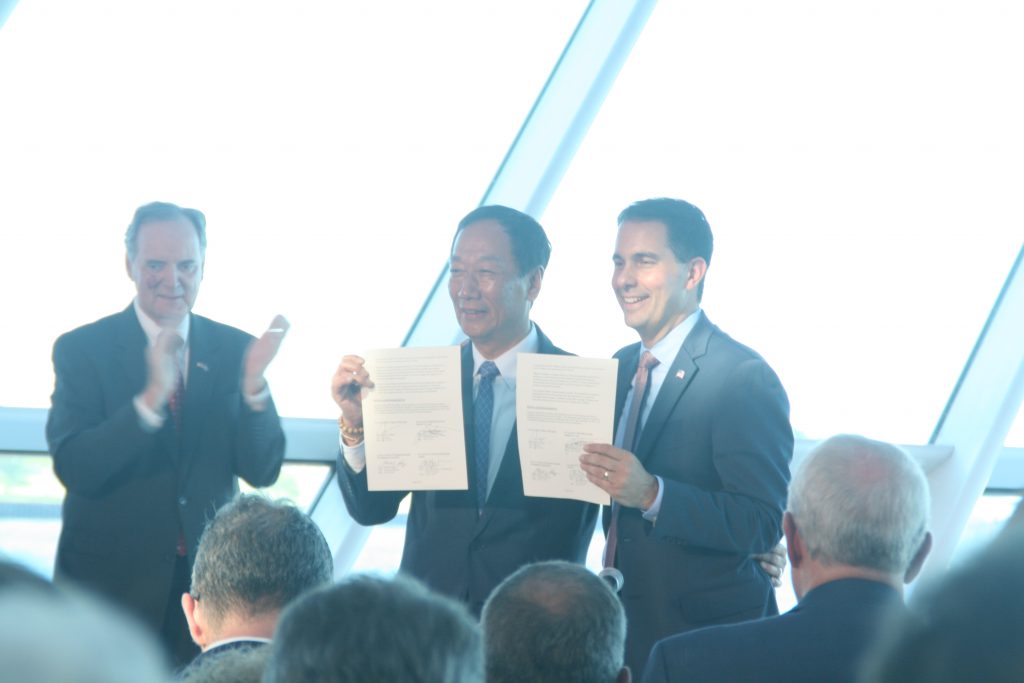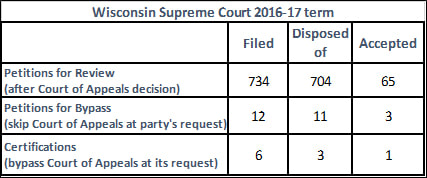Foxconn Law Transforms State Courts
Company gets more and quicker access, while everyone else waits for justice.

Foxconn chairman Terry Gou and Governor Scott Walker hold a memorandum of understanding. Photo by Jeramey Jannene.
The new Foxconn law changes the rules for how Wisconsin courts work in cases involving government decisions about the firm and its site, giving Foxconn quicker access and more access to appellate courts than other firms and individuals in the state have.
And Foxconn’s ability to push to the head of the line means that other Wisconsin citizens seeking justice in the courts face potentially lengthy delays.
Under the new law, Foxconn gets multiple appeals of unfavorable trial court rulings in a single case. It doesn’t work that way for others. With a few exceptions, litigants in trial courts must await final judgment before appealing the case.
If Foxconn doesn’t like how a circuit court rules, it gets to jump right to the highest court in the state for its appeals. The vast majority of non-Foxconn appellants head first to the Wisconsin Court of Appeals. Only after that court issues its decision does the losing party petition the Supreme Court of Wisconsin to review the case.
Not so for litigants in an EITM-zone case. Instead, the Court of Appeals must certify an EITM-zone appeal to the Supreme Court, meaning that the case may bypass the Court of Appeals. Contrary to its exercise of discretion in other cases, the Court of Appeals has no choice regarding certification, regardless of whether that court believes certification is justified.

There were only four appeals that skipped the Court of Appeals and went straight to the State Supreme Court during the high court’s last term. The new Foxconn legislation will require the Court of Appeals to certify every appeal involving a government decision about Foxconn.
Moreover, the briefing and certification process in Foxconn cases occur on an expedited schedule. Previously, the legislature directed expedited schedules for cases involving termination of parental rights and consent to a minor’s abortion. The Foxconn legislation puts EITM-zone appeals on a similar fast track.
Certification does not mean the Supreme Court must take the case. The Supreme Court generally reviews cases that involve a significant question of constitutional law, new doctrine, a novel issue with statewide impact, a legal question likely to recur, a conflict between a lower-court decision and decisions of other courts, or the need for policy. Four of the seven justices must agree to the bypass.
The Foxconn legislation bumps any appeal concerning governmental decisions about an EITM zone to the Supreme Court for consideration of certification regardless of whether that case involves matters of statewide concern, unsettled law or policy, or lower-court conflicts. A Foxconn appeal of, say, a building inspector’s requirement, a municipal zoning decision, or an environmental agency determination may not have statewide significance.
Nevertheless, the Supreme Court now must spend time considering each certification, impacting the Court’s other work.
Certification is generally not a quick process. Each one requires a commissioner to draft a memorandum analyzing the facts and law involved in the appeal and recommending whether certification should be granted. The justices are expected to read each certification and memorandum, listen to an oral report by the commissioner, then decide whether to grant certification. During the 2016-2017 term, the Supreme Court received only six certifications from the courts of appeals and accepted only one. Presumably, EITM-zone litigation will significantly increase the number of certifications the Supreme Court will have to consider.
It’s too early to know whether the Court will actually grant more certifications. Will EITM-zone litigation cause the Supreme Court to accept fewer cases not related to Foxconn?
Moreover, the Foxconn legislation mandates that the Supreme Court “give preference” to a certification regarding an EITM-zone appeal. In other words, the Supreme Court must place any Foxconn EITM-zone case ahead of other appeals, including those concerning important civil and criminal matters.
Once Foxconn starts filing appeals, no matter how inconsequential, the court’s work on issues of statewide importance will get pushed to the side.
Based on this term’s calendar, here are the types of cases that could sit when Foxconn skips ahead in line:
- Issue – Whether contractors are immune from liability for injuries or death occurring on recreational land. Property owner Conference Point hired Creekside Tree Service to trim trees on land that included a public right-of-way path around Geneva Lake. Creekside set up cones and its employees tried to halt tree work until pedestrians passed. Nevertheless, as Jane Westmas walked on the path near the trimming work, a tree limb fell and killed her. Her husband and son sued Creekside, which argues to the Supreme Court that it should escape liability under a statute providing a land owner with immunity regarding death or injury of a person engaged in recreational activity on the property.
- Issue – Whether the “implied consent” law that applies to all drivers on Wisconsin roads allows police to draw blood from an unconscious motorist without a warrant. A police officer received information that Gerald Mitchell appeared drunk and was driving a gray minivan. The officer found Mitchell walking near the van. Mitchell appeared intoxicated and blew a .24 on a preliminary breath test, so the officer arrested him. On the way to the hospital for a blood test, Mitchell became incapacitated and would not wake up or respond to stimulation. The officer admitted in court that he could have applied for a warrant but did not, and no emergency circumstances existed. Wisconsin law provides that any person who drives on public roads in the state is deemed to consent to breath, blood or urine tests to determine the presence of alcohol and presumes that an unconscious person did not withdraw consent. The case has statewide impact regarding whether drawing blood from an unconscious motorist violates the United States Constitution’s protection against unreasonable searches and seizures
- Issue – Whether constitutional free-speech rights prohibit prosecution for statements made within the privacy of the home. Ginger Breitzman was convicted of disorderly conduct for berating her son with profanities after her son burned popcorn in the microwave. The son had been talking with a friend and hid his phone in his pocket, allowing the friend to hear Breitzman’s tirade. Breitzman argued that though her speech was offensive, it was in her own home and could not have caused a disturbance in the community. A decision could have statewide application regarding what constitutes disorderly conduct and the scope of free-speech rights within the home.
- Issue – The interplay between the concealed-carry statute and the weapon safe-transport statute. When police stopped Brian Grandberry he admitted having a loaded gun in his glove compartment. Grandberry did not have a concealed-carry permit but argued that he did not violate the law because he was following the safe-transport statute, which controls the lawful placement of weapons in vehicles.
- Issue – Whether an adult can be charged with a crime for conduct occurring when he was under 10 years old. As an adult, Shaun Sanders was charged with fondling his younger sister’s breasts. The fondling occurred when Sanders was between nine and 12 years old. He argues that he should not be held criminally responsible for the conduct occurring when he was nine, as 10 is the earliest age for a juvenile delinquency charge. The case could have statewide impact regarding the legal treatment of criminal conduct by children.
- Issue – Whether the Wisconsin Employment Relations Commission must disclose names of those voting in a municipal employees’ union recertification election while the election is ongoing or can withhold those names until after the election period closes. During a 20-day school-district union recertification election in 2015, Madison Teachers, Inc. filed a public record request for the names of those who had voted up to that date. James Scott, chairman of the Commission, withheld the names until after the election period closed. On appeal, Attorney General Brad Schimel contends on Scott’s behalf that public policy against voter intimidation outweighed public policy in favor of disclosing public records. The case should have statewide impact due to the yearly recurrence of public-employee unions’ recertification elections and Scott’s alleged withholding of names upon public-records requests during at least one subsequent election.
More about the Foxconn Facility
- Foxconn Acquires 20 More Acres in Mount Pleasant, But For What? - Joe Schulz - Jan 7th, 2025
- Murphy’s Law: What Are Foxconn’s Employees Doing? - Bruce Murphy - Dec 17th, 2024
- With 1,114 Employees, Foxconn Earns $9 Million in Tax Credits - Joe Schulz - Dec 13th, 2024
- Mount Pleasant, Racine in Legal Battle Over Water After Foxconn Failure - Evan Casey - Sep 18th, 2024
- Biden Hails ‘Transformative’ Microsoft Project in Mount Pleasant - Sophie Bolich - May 8th, 2024
- Microsoft’s Wisconsin Data Center Now A $3.3 Billion Project - Jeramey Jannene - May 8th, 2024
- We Energies Will Spend $335 Million on Microsoft Development - Evan Casey - Mar 6th, 2024
- Foxconn Will Get State Subsidy For 2022 - Joe Schulz - Dec 11th, 2023
- Mount Pleasant Approves Microsoft Deal on Foxconn Land - Evan Casey - Nov 28th, 2023
- Mount Pleasant Deal With Microsoft Has No Public Subsidies - Evan Casey - Nov 14th, 2023
Read more about Foxconn Facility here
Court Watch
-
No Unemployment Benefits For Worker Making Homophobic Remarks
 May 17th, 2022 by Gretchen Schuldt
May 17th, 2022 by Gretchen Schuldt
-
Appeals Court Upholds Injunction Against Abortion Protester
 Mar 13th, 2022 by Gretchen Schuldt
Mar 13th, 2022 by Gretchen Schuldt
-
80% of State’s Judicial Races Uncontested
 Feb 20th, 2022 by Gretchen Schuldt
Feb 20th, 2022 by Gretchen Schuldt






















A imagine a common theme in the six were a compelling need to have it heard quickly. Deadlines, constructions schedules and the like – similar to a building schedule that Foxconn will be employing.
Not saying it is right but the final version that recognizes it might need to jump the line is less impactful than the original bill that mandated bypassing the appeals court.
Typical of Scotty W. He just doesn’t care nor adhere to any laws. He is a dictator of the state and has his purchased legislature and Supreme Court backing up the Koch’s and other Libertarian Secret Groups that buy anything they want because Wisconsin is up for sale no matter how it negatively affects the average person. How did we get here? Don’t the people who vote for him realize they will be living in a waste land with no roads after his mining, Foxconn, deep water pollution deals and other destructive projects are pushed through because he was paid to approve them.
It’s just Pandora’s Box, after the FoxxConned deals are set, any other corporation can claim unequal treatment and appeal all the way to the State Supreme(WMC) Court.